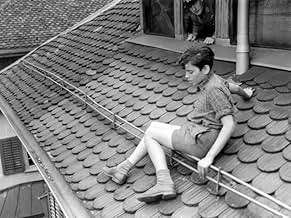- Director
- Writers
- All cast & crew
- Production, box office & more at IMDbPro
Storyline
Did you know
- SoundtracksIn allen Gassen wohnt das Glück
Performed by Lys Assia
Featured review
Kurt Früh's "Oberstadtgass" - in reality the alleys and little streets around St. Peterhofstatt in central downtown Zürich - are a quarter of the Middle Ages. In 1956, most apartments are still non-renovated, have hardly any comfortable infrastructure, so that many poor people live here, while the other houses are inhabited by hand-workers. In the restaurant "Veltliner Keller" - today one of the priciest Zurich restaurants that serves exclusively high-style cuisine - the neighbors gather for a mug beer or cold Fleischkäse with mustard. From the movie it gets clear that only one family can be counted to the better-situated ones (Winterhalter). There is hardly circulation, the narrow streets are from cobblestone, people walk along steep stair-houses up to the roofs where they beat carpets and enjoy a little rest. Everybody knows everybody, the postman Jucker being naturally a central person. The old women gossip. When something extraordinary happens, the whole quarter knows it in no time. It is clear: Nobody is alone here, and even the nosiness of the neighbors testifies that everybody is part in a social network - qua social control. However, there are two exceptions. First the girl whom the postman does not know. This is explicitly said. She tries to commit suicide, but the sledge-hammer noise of the street prevent the old women from blowing up the story into a state occasion. Second, and mainly, there is Mäni Brändli, a half-orphan whose sick mother has to clean aborts in order to make a miserable living. The boy is tormented psychologically and physically by the other children, but he always manages to give them back - and unfortunately is as the only one perceived as being aggressive.
Postman Jucker and his wife had lost her one and only child, a boy, when he was 7 years old. When the sadistic Mr. Winterhalter intends to get Mäni's guardian, Mr. Jucker keeps the boy with him. However, this leads to big problems with his wife who connect overcome the loss of her own child. While this movie is a typical Schaggi-Streuli-movie (cf. "Polizischt Wäckerli"), its value, half a century after it was made, is mainly that it shows the enormous changing that Zurich has undergone in this decades. Where the lower-class people lived in their simple apartments, nowadays the richest of the rich live, all the apartments are fully renovated and brought up to a luxurious "standard". (A family apartment at St. Peterhofstatt costs today, in 2010, over 4'000 Swiss Franks, which is almost 4'000 dollars.) All the old restaurants still exist, but all have also changed into luxury establishments. It goes by itself, that the social cohesion between the families that live there is practically zero: one greets one another, but one would never stand together as they did 50 years ago in order to prove the innocence of the "abort-boy" (Hüüsli-Bueb) Mäni.
Postman Jucker and his wife had lost her one and only child, a boy, when he was 7 years old. When the sadistic Mr. Winterhalter intends to get Mäni's guardian, Mr. Jucker keeps the boy with him. However, this leads to big problems with his wife who connect overcome the loss of her own child. While this movie is a typical Schaggi-Streuli-movie (cf. "Polizischt Wäckerli"), its value, half a century after it was made, is mainly that it shows the enormous changing that Zurich has undergone in this decades. Where the lower-class people lived in their simple apartments, nowadays the richest of the rich live, all the apartments are fully renovated and brought up to a luxurious "standard". (A family apartment at St. Peterhofstatt costs today, in 2010, over 4'000 Swiss Franks, which is almost 4'000 dollars.) All the old restaurants still exist, but all have also changed into luxury establishments. It goes by itself, that the social cohesion between the families that live there is practically zero: one greets one another, but one would never stand together as they did 50 years ago in order to prove the innocence of the "abort-boy" (Hüüsli-Bueb) Mäni.
- semiotechlab-658-95444
- Oct 23, 2010
- Permalink
Details
- Release date
- Country of origin
- Language
- Also known as
- In allen Gassen wohnt das Glück
- Filming locations
- Production company
- See more company credits at IMDbPro
- Runtime1 hour 35 minutes
- Color
- Sound mix
- Aspect ratio
- 1.37 : 1
Contribute to this page
Suggest an edit or add missing content









